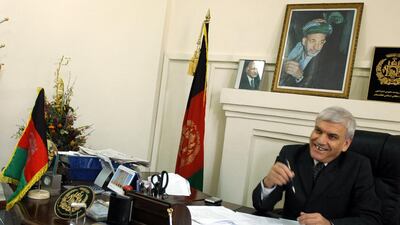KABUL // Hamid Karzai was several years into his tenure as president of Afghanistan when one of his loyal ministers realised the government was in trouble. Mohammed Amin Farhang used a cabinet meeting to complain about a budgetary issue that he regarded as unconstitutional.
“Karzai got very angry, slammed his fist on the table, said ‘I cannot control this cabinet anymore’ and left,” he recalled.
For Mr Farhang it was the beginning of the end. He was summoned to the president’s office and privately rebuked, then later accused of corruption by the attorney general. A former minister of commerce, he now lives as an ordinary citizen in Kabul and has been warily watching a new political era unfold, waiting to see if past mistakes will be repeated.
Mr Karzai recently stepped down after completing his second term. The long and bitter election campaign to replace him threatened to plunge the country into civil war before the US intervened and the two leading candidates came to a power-sharing agreement.
Last month Ashraf Ghani, a former World Bank technocrat, was sworn in as president while his rival, Abdullah Abdullah, took up the new position of chief executive. They must now deal with a number of issues that would challenge even the strongest government, let alone one built on fragile alliances.
Security is deteriorating across the country and the economy is in sharp decline. Many powerful warlords are jockeying to have a significant stake in the future.
As supporters of Mr Ghani and Mr Abdullah traded barbs throughout the summer, The National spoke to men who served in the last government to assess the problems that may lie ahead. Their experiences show the pitfalls of holding political office in Afghanistan.
It was December 2001 when Mr Karzai flew into Bagram airfield having just been chosen as head of the new interim government weeks after a US-led attack had swept the Taliban from power. He would go on to win two elections for the presidency.
Mr Farhang accompanied him on that historic flight and was by his side for much of the subsequent decade, serving in positions that included minister of commerce.
He believes Mr Karzai’s rule “can be divided into two parts”. He said in the first “we would talk with each other and he would listen to us, listen to literate and like-minded people” who wanted to encourage a younger generation to run the country along modern, democratic lines. The second half was when “Afghanistan entered a crisis because of him”.
Mr Farhang is convinced that a change occurred when notorious former mujaheddin commanders and warlords once heavily backed by the US began to exert greater influence over the president.
At the same time a coterie of sycophantic advisers surrounding Mr Karzai would not warn him about the effect this was having. He said the president’s relationship with the West deteriorated as a result.
“I can tell you he [Mr Karzai] did not attach importance to parliament, to jirgas, to the people,” he said. “Instead of the democracy that is agreed in our constitution he formed a small autocratic regime.”
Mr Farhang said important progress had been made since 2001, with far greater freedom of speech than in the past and a thriving civil society. However, he described the bitter aftermath of the election campaign as “a war for power” and said it was “shameful” that “we are still going to the Americans to solve our problems”. The fact that several notorious figures supported Mr Ghani and Mr Abdullah worried him.
“Unfortunately these two candidates have also not learnt lessons from Karzai. Again they have brought those elements around them who are vote banks. They are not thinking that right now they are vote banks but tomorrow they will be trouble,” he said.
Since taking office Mr Ghani has already had to navigate his way through contrasting domestic and international pressures.
He quickly agreed plans to keep some foreign troops in Afghanistan beyond 2014 – provoking an immediate reaction from the Taliban who vowed to continue fighting. He then angered human rights groups by failing to halt the execution of five men found guilty in a controversial gang-rape case. Mr Ghani is now in the process of deciding who will be in his cabinet.
One person who served on the new president’s election campaign team is Mohammed Halim Fidai, a former governor of Maidan Wardak province under Mr Karzai.
Speaking before Mr Ghani was sworn in, he said that insecurity in the area during his time as governor had been directly encouraged by high-profile political figures.
They included Haji Mohammed Mohaqiq, now a deputy to the new chief executive, who he accused of arming one ethnic group against another and of having close ties to Iran.
He also claimed officials in the government had helped orchestrate attacks on convoys carrying fuel to Nato forces – an accusation backed up by a 2010 US house of representatives subcommittee report.
Mr Fidai alleged the trucks would be burnt in phoney ambushes and the fuel sold on the black market. In other instances he said militants were paid off to let convoys pass and companies arranged for convoys from rival businesses to be hit.
He added that when he tried to get the men involved sacked from their positions he struggled in part because of the influence of powerful figures such as Mohammed Qasim Fahim, a former Northern Alliance commander who served as vice president during Mr Karzai’s second term in office.
Mr Fahim died of natural causes earlier this year but his associates continue to have huge influence in government circles.
Mr Fidai said these problems showed that a clean administration free from the influence of warlords was now essential. “Otherwise working in a polluted environment – socially polluted, politically polluted, financially polluted – is very difficult,” he said. “It’s very difficult. You cannot make the progress that you planned or you envisioned.”
foreign.desk@thenational.ae

